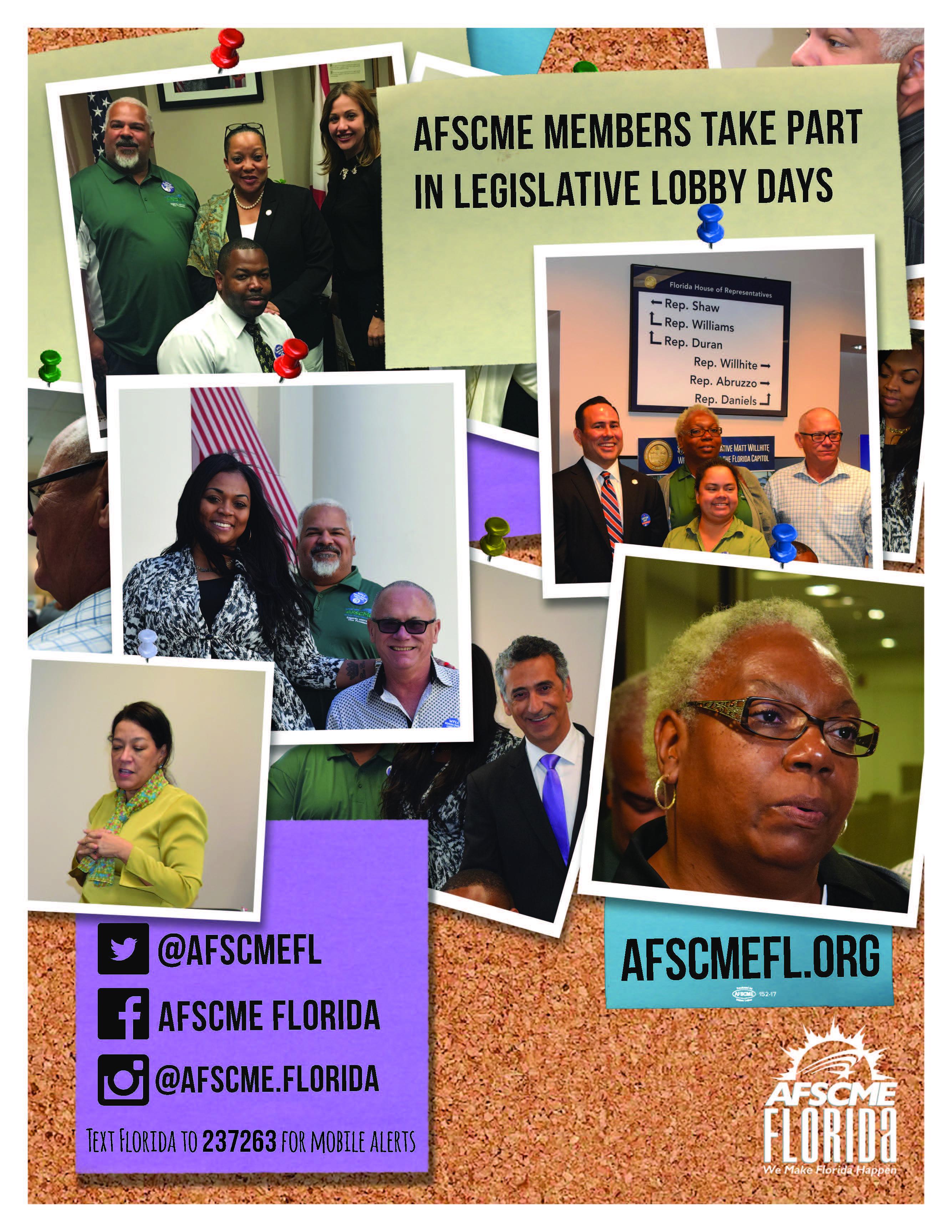The 2017 Florida Legislative session was one filled with contrasts. Contrasts between the priorities of each chamber. Contracts between the will of the Legislature and the wishes of Governor Scott. Contrasts between the process laid out by leadership at the beginning and the actual way important and massive legislation came together by the end of the extended session.
AFSCME Florida knew going into this session that in an $83 billion budget that there was an opportunity to make real progress on issues important to our members and those they serve. But we were also fully aware that, as in past years, our members would be the targets of partisan legislation that would require us to work closely with allies and get members involved in the process in order to prevail.
At the end of the day, we can point to some very clear and meaningful victories that were made possibly thanks to the leadership of Senators and Representatives from both parties who understand the value that AFSCME Florida adds to the community, respects the work our members do and were willing to stand with us. But there is work to do in the coming months and years to reverse some bad pieces passed as well.
Economic
- The Legislature $183 million for pay raises for state employees, the first in 11 years. Since this is not a one-time bonus, not off-set by takeaways or some other gimmick, 3-4% raise, depending on previous compensation level, is a huge step forward.
Protecting Our Voice at Work
- House Bill 11 represented union-busting legislation in its purest form by setting an arbitrarily percentage of membership each and every year. Even after workers packed committee meetings to voice their strong opposition, House leaders continued their push to roll back workers' rights even though they couldn’t explain why this is anything more than template anti-worker legislation from organizations like the American Legislative Exchange Council (ALEC).
- While it was able to pass the House, AFSCME led the education efforts and negotiations that was successful in stopping it from advancing in the Senate. We expect this legislation to be back next year so we will be coordinating efforts across the state to educate members and nonmembers, in addition to lawmakers, about what impact this legislation would actually have in the modern worksite.
- We have been able to implement a labor-management committee for state workers that will help to ensure the contract is better enforced and that issues, such as the proper granting of comp time, can be resolved.
Pension
- Legislation that will impact all AFSCME members who participate in the Florida Retirement System will be new procedures for public employees as it relates to their pension. Instead of defaulting into the state’s secure and funded pension plan, new employees will now need to choose the plan or be defaulted into a risky 401K.
- While we were not able to stop this legislation, we were able to move the period that employees have to make a choice before defaulting into the 401k from the proposed five months to nine months.
- We will be working with locals across the state to add choosing the pension to the highly successful new hire orientations and labor management meetings to help educate members on why the pension plan is the better plan for them.
- People change jobs. And sometimes workers will return to an FRS-eligible position after having left a previous one when they took another job. New language we won will allow them to again enter the pension plan. This is a big win for our more experienced workers and strengthens our argument to new hires about why choosing the pension does not limit their future career choices.
Health Care
- Tied to the pay raise for state workers was legislation that will change the state group health insurance into a four-tiered plan that will be rolled out in 2020. While we opposed this legislation, it is not the sweeping change that has been described by some of the news coverage. No worker will have to choose one of the new health coverage plans and we have a few years to ensure that it is implemented in as beneficial a manner as possible.
- We were able to secured language that grants AFSCME Florida access to state employees within the bargaining unit so that we can help to educate them on their options in health coverage, showing the union in action and a force for good across worksites and across the state.
Other
- During the first week in April, seven AFSCME leaders from Local 199, Local 1542 and Local 3292 in Miami-Dade County participated in the Florida AFL-CIO’s Working Families Lobby Corps to make sure all working people in the state are represented fairly and are not used as pawns by the power brokers of this state. This participation was part of an unprecedented level of involvement by AFSCME members and retirees across the state through phone calls, emails and community event involvement that ensured our voices were heard.
- Working closely with our allies, we stopped no fewer than seven anti-immigrant bills that were threats to our communities.
- Legislation that will help increase Floridian’s participation in the electoral process and ensure their votes are counted was passed. The bill provides a process that will let voters fix mismatching signatures on their vote-by-mail ballots so they can be counted.
- In a huge win to members working at universities at county or municipal buildings, legislation that would have allowed for open carry of firearms was stopped.
- We also helped to stop legislation that would have made the search process for presidents and senior officials at colleges and university except from the state’s Sunshine Laws.
- We protected the rights of members and all state citizens to secure legal help in lawful public records requests through a series of amendments that addressed ways to crack down on people abusing the existing process.
- The Legislature declined to seize an opportunity to improve the workers comp situation for Floridians injured on the job. While still one of the worst systems in the country, we were able to stop it from becoming even worse as this was one of the issues with the greatest level of AFSCME members contacting their elected officials.
- Like last session, we worked with allies to stop preemption legislation that would have completely striped local governments from passing living wages and other worker-friendly ordinances.

